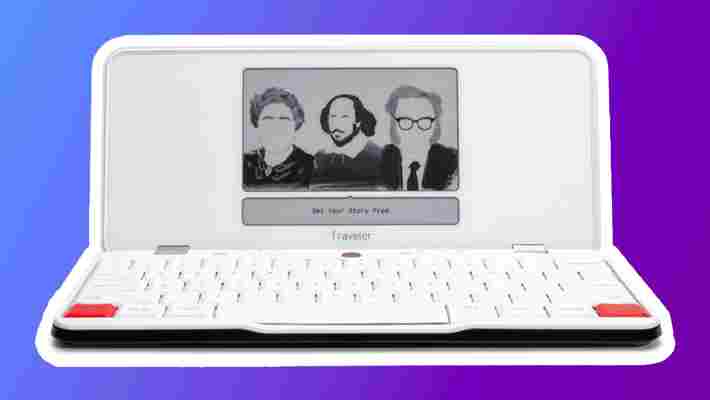
The thing about writing is that it’s hard. And the thing about writers is that they’re always searching for something to make it easier. And that’s where Astrohaus’ Freewrite Traveler comes in.

Lots of words I don’t recognize there. Astrohaus? Freewrite Traveler?
Well, aren’t you demanding? But I’ll tell you.
Astrohaus is an American company that makes productivity tools. Its first big product was the 2014 crowdfunded Freewrite , effectively an e-ink typewriter to help people write distraction free.
Now though, it’s releasing a new version of its famous machine: the Freewrite Traveler, a smaller and more portable version of the hardware.
What’s the point of the Freewrite Traveler?
It’s for writers to write with.
Specifically, it’s designed for creative writers (the standard Freewrite was originally called the Hemingwrite) — but really it’s for anyone who wants to get a lot of words down at once in a distraction-free way.


How does it work?
It’s pretty simple. You open up the lid and start typing. There are no apps, no browser: just you and a text editor. And your thoughts. Your awful, harrowing thoughts.
The Freewrite Traveler does connect to WiFi, but that’s only for syncing purposes. The device can connect with Evernote, Google, and Dropbox, as well as its propriety Postbox system. This means your documents are backed up and synced.
And it works well. The process was fiddly at first, but everything became clear after about five minutes, and it’s been running in the background efficiently since then.
Tell me about writing on it
First things first, the keyboard is delicious. It’s an absolute joy to use and is up there with the best non-mechanical typing experiences I’ve ever had. The keys are that perfect balance between firm and spongy, the spacing is perfect. It feels luxurious and precise.
The lack of dedicated arrow keys is a bit annoying, although you can use a function button and WASD to mimic these. I also found the lag between pressing a key and it appearing on the e-ink screen irritating, but I got over that eventually.
And this is just the beginning of the problems.
What sort of problems?
Let’s talk more about the Freewrite Traveler’s e-ink screen — one of its main marketing points.
First up, the size. Although it’s not a deal-breaker, I wish it was a little wider. The way it sits in the middle of this wide space feels awkward and is a missed opportunity for some more word real estate.
Far more concerning though is the lack of a backlight.
The e-ink display looks crisp in decent daylight, but becomes tricky to read in much less. Basically, it’s not really functional in any sort of “mood lighting” — a concept independent café visitors will be familiar with.
I truly don’t understand why Astrohaus didn’t include a backlight on the Freewrite Traveler. It makes no sense to me.
Battery life maybe?
Potentially, but any battery life losses would be an overall usability gain. A backlight is such a basic bit of functionality and there’s really no reason not to include one.
While we’re on the topic of battery life…
Yeah, the Freewrite Traveler’s battery life is amazing. I’ve had it the review unit about two weeks and haven’t had to charge it yet. This is where the e-ink display really pays off.
How was the Freewrite Traveler experience?
Basically, it’s good for pumping out a stream of words. If you have an outline you want to turn into prose, it’s an excellent tool. Like I said, the only negative on this front is the lag between typing and it appearing on the screen — but that’s expected and easily adapted to.
The issue is there’s more to writing than putting words on the page.
When I’m working on a piece of creative long form, I begin by outlining chapters in bullet points. As the story evolves, I’m constantly jumping back to these, adding detail and tweaking elements.
Once this is done I’ll turn it into prose — the stage I’d use the Freewrite Traveler for.
After this is when the real editing begins. The shifting of paragraphs, the removal of scenes, the tweaking of sentences — all nimble operations. And ones the Freewrite Traveler is unable to achieve.
That doesn’t sound great…
Potentially, but Astrohaus is clear on its website that the Freewrite range is not an editing tool. This is a device that has a specific purpose: drafting.
And you know what? It does that well. It does it damn well.
Is there a “but” coming…
…but it’s too damn expensive for such a specific tool.
How much does the Freewrite Traveler cost?
Well, it’s selling for $599.
Goddamn, $599?
Yeah. That’s more than an entry-level iPad ($399). For the amount of money the Freewrite Traveler is selling for, you can buy yourself a truly competent laptop from companies like Honor, ASUS, HP, Acer, Lenovo, and, well, pretty much anyone.
I get that these don’t do exactly the same thing as the Freewrite, but they are also far more versatile.
What are your overall thoughts?
Honestly? I really love the machine. But this is really a $200-300 bit of hardware. At that price, I could overlook many of its issues. And it does have issues.
The unlit e-ink screen makes navigating through menus irritating and editing almost impossible. The casing around the machine feels decidedly non-premium. And it’s only really useful for maybe 20% of the whole writing process. And that’s being generous.
Here’s the rub though: I like it. If it was around the $250 mark I’d be in the queue to buy one, but more than double that? Nah, no thanks.
Who’s the Freewrite Traveler for?
I’d say three things:
Are you a writer who’s struggling to get words on the page?
Do you already have a good computer?
And do you have lots of spare cash?
If you answered yes to those three points, then the Freewrite Traveler is for you.
But what if you just answered yes to the first question? And you’re really looking for something to kickstart your prose? Well, I’d recommend you get a laptop and emulate the Freewrite experience — and there are lots of ways.
You could get a distraction-free word processor, like iA Writer . You could experiment with things like the pomodoro technique . You could set up a separate user on your laptop for writing and remove every app but your essentials.
This is my point: there are lots of things you can do before shelling out $600. The Freewrite Traveler is a luxury tool, not an essential one.
And you know what? Saying this hurts. Because although the Freewrite Traveler is a one-trick pony, I just happen to love that trick.